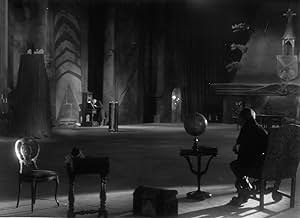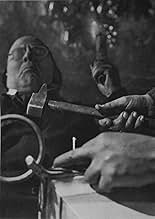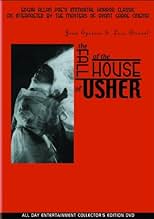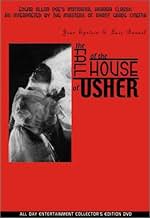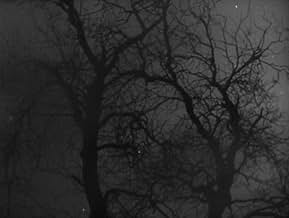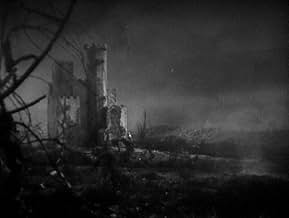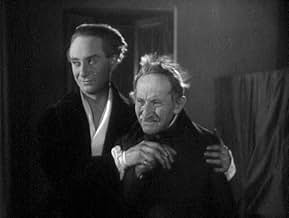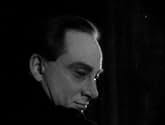AVALIAÇÃO DA IMDb
7,2/10
4,9 mil
SUA AVALIAÇÃO
O Lorde Roderick Usher vive numa casa perdida no meio dos lagos, evitada pela população da vila próxima, e está muito preocupado com a saúde da esposa Madeleine.O Lorde Roderick Usher vive numa casa perdida no meio dos lagos, evitada pela população da vila próxima, e está muito preocupado com a saúde da esposa Madeleine.O Lorde Roderick Usher vive numa casa perdida no meio dos lagos, evitada pela população da vila próxima, e está muito preocupado com a saúde da esposa Madeleine.
- Direção
- Roteiristas
- Artistas
- Direção
- Roteiristas
- Elenco e equipe completos
- Produção, bilheteria e muito mais no IMDbPro
Avaliações em destaque
I had the chance to see this film about 20 years ago and it's still quite fresh in my mind (if you knew me you'd find this very unusual). I still remember how I was wrapping myself up during the course of the film as I was feeling colder and colder - it was a summer night, mind you.
The plot sticks tightly to the original story and it shows France's affinity with Edgar Allan Poe since it was the great Charles Beaudelaire himself who translated Poe's work into French.
The film manages to create an unusual sense of discomfort unlike most classic horror films where the settings etc. result more in a feeling of (uneasy) cosiness. The insanity in Roderick Usher's face is utterly believable as well as the parts of the other characters. What tops it all up is the constant draught in the mansion. Wall hangings are steadily moving and bits of paper and dust are blowing through the corridors. Hence the above mentioned feeling of physical coldness.
All I can say is I need to see this film again and I would be grateful if anyone could point me in the right direction (Quelq'un en France, peut-etre?).
The plot sticks tightly to the original story and it shows France's affinity with Edgar Allan Poe since it was the great Charles Beaudelaire himself who translated Poe's work into French.
The film manages to create an unusual sense of discomfort unlike most classic horror films where the settings etc. result more in a feeling of (uneasy) cosiness. The insanity in Roderick Usher's face is utterly believable as well as the parts of the other characters. What tops it all up is the constant draught in the mansion. Wall hangings are steadily moving and bits of paper and dust are blowing through the corridors. Hence the above mentioned feeling of physical coldness.
All I can say is I need to see this film again and I would be grateful if anyone could point me in the right direction (Quelq'un en France, peut-etre?).
Predictably morbid and grim, this early cinematic tribute to Poe offers some interesting images and beautifully haunting music. I liked the sequence showing the lace-draped coffin, as it was carried out of that cavernous room.
More stylistic than substantive, the overall effect of the film is to engender a sense of suffocating gloom, rather than to tell an interesting story. It's very much like what one would expect in a nightmare. Space seems strung-out. People are not quite real. Pacing is so slow as to render time suspended between two swings of the clock pendulum.
I don't recall a film that conveyed such an overwhelming sense of introverted bleakness, oppression, and ubiquitous death. Even the trees were dead.
A lot of viewers will find this film lifeless ... so to speak. But for those interested in the antiquity of the occult, or Poe in particular, this film will excite like no other.
More stylistic than substantive, the overall effect of the film is to engender a sense of suffocating gloom, rather than to tell an interesting story. It's very much like what one would expect in a nightmare. Space seems strung-out. People are not quite real. Pacing is so slow as to render time suspended between two swings of the clock pendulum.
I don't recall a film that conveyed such an overwhelming sense of introverted bleakness, oppression, and ubiquitous death. Even the trees were dead.
A lot of viewers will find this film lifeless ... so to speak. But for those interested in the antiquity of the occult, or Poe in particular, this film will excite like no other.
As was inevitable, movies of the silent era depended on their imagery in a way that became less important after the introduction of sound. During the same time period there were a number of hugely significant art movements that would influence the relatively new medium of cinema. Art trends such as cubism, dada, expressionism and surrealism had enormous impact on films of the time. The Fall of the House of Usher is a good example of a film based on 19th century literature but brought to the screen via the artistic sensibilities of the day, namely expressionism and surrealism. Because of this, like its peers such as The Cabinet of Dr. Caligari and Nosferatu, it has attained a timeless quality and it will always remain a fascinating art-horror film.
The plot-line such that it is, is about a man named Allan who visits his friend Roderick Usher at his remote mansion. Usher lives with his sick wife Madeline, who suffers from some mysterious unknown disease. He is obsessed in painting a portrait of her. She dies and Usher, unable to accept it, descends into madness.
The tone is definitely downbeat and this is reflected by the gloomy haunting imagery used throughout. The strikingly inventive visuals escalate as the film progresses as a way of reflecting Roderick Usher's journey into insanity. Billowing curtains, close-ups of a giant pendulum, a haunting painting of Usher's wife, a moon-lit trip to the mausoleum and swirling mist are just some of the details captured. The film is overloaded in creepy Gothic atmosphere. Production design is excellent, with the grounds of the mansion populated with dead trees and swirling mist, while the interior has enormously high ceilinged rooms decorated with mirrors, curtains and Gothic furniture. In keeping with the film's artistic bent, everything is photographed quite excellently with many close-ups and unusual angles. The overall feeling of the film is that of a fever-dream which is very much in keeping with the central character's damaged state of mind.
In the best silent films, the storyline is very much secondary to the ambiance. The Fall of the House of Usher is no different and is one of the greatest silent horror films. It's an often quite stunning mood piece and comes highly recommended.
The plot-line such that it is, is about a man named Allan who visits his friend Roderick Usher at his remote mansion. Usher lives with his sick wife Madeline, who suffers from some mysterious unknown disease. He is obsessed in painting a portrait of her. She dies and Usher, unable to accept it, descends into madness.
The tone is definitely downbeat and this is reflected by the gloomy haunting imagery used throughout. The strikingly inventive visuals escalate as the film progresses as a way of reflecting Roderick Usher's journey into insanity. Billowing curtains, close-ups of a giant pendulum, a haunting painting of Usher's wife, a moon-lit trip to the mausoleum and swirling mist are just some of the details captured. The film is overloaded in creepy Gothic atmosphere. Production design is excellent, with the grounds of the mansion populated with dead trees and swirling mist, while the interior has enormously high ceilinged rooms decorated with mirrors, curtains and Gothic furniture. In keeping with the film's artistic bent, everything is photographed quite excellently with many close-ups and unusual angles. The overall feeling of the film is that of a fever-dream which is very much in keeping with the central character's damaged state of mind.
In the best silent films, the storyline is very much secondary to the ambiance. The Fall of the House of Usher is no different and is one of the greatest silent horror films. It's an often quite stunning mood piece and comes highly recommended.
A stranger called Allan (Charles Lamy) goes to an inn and requests transportation to the House of Usher. The locals remain reluctant, but he gets a coach to transport him to the place. He is the sole friend of Roderick Usher (Jean Debucourt), who leaves in the eerie house with his sick wife Madeleine Usher (Marguerite Gance) and her doctor (Fournez-Goffard). Madeleine is the beloved muse and model and is being painted by Roderick. When she dies, Roderick does not accept her death, and in a dark night, Madeleine returns.
For those like me that have not read the story of Edgar Allan Poe, the conclusion of "La Chute de la Maison Usher" is quite confused. However, the Gothic cinematography is very impressive, recalling the German Expressionism. It is amazing how Jean Epstein was able to produce such atmosphere, considering the primitive technology of 1928, with difficulties in lighting, sensibility of films, edition table and portability of cameras. However, the shadows and lights are really amazing in this black and white film. This movie was the first work of Luis Buñuel in the cinema industry, working as assistant of Jean Epstein. Just as a curiosity, the resemblance of Charles Lamy with Carlos Alberto Parreira, the coach of the Brazilian soccer team, is incredible. My vote is nine.
Title (Brazil): "A Queda da Casa de Usher" ("The Fall of the House of Usher")
For those like me that have not read the story of Edgar Allan Poe, the conclusion of "La Chute de la Maison Usher" is quite confused. However, the Gothic cinematography is very impressive, recalling the German Expressionism. It is amazing how Jean Epstein was able to produce such atmosphere, considering the primitive technology of 1928, with difficulties in lighting, sensibility of films, edition table and portability of cameras. However, the shadows and lights are really amazing in this black and white film. This movie was the first work of Luis Buñuel in the cinema industry, working as assistant of Jean Epstein. Just as a curiosity, the resemblance of Charles Lamy with Carlos Alberto Parreira, the coach of the Brazilian soccer team, is incredible. My vote is nine.
Title (Brazil): "A Queda da Casa de Usher" ("The Fall of the House of Usher")
Wow! Words cannot describe how absolutely magical this film is, but I will try. Its not often that a film will truly captivate me from moment one as this one has, especially in the world of silent film. Its been a long time since I've been glued to the screen in complete rapture. Granted, I like the silent medium and of course I respect it, but usually I watch them as a piece of film history; I see them for what they are and judge them only amongst their peers: other silent films. But this silent film is like no other! There were many times when I felt as though if Guy Maddin were to make a actual serious film this would be it. Anyone who has seen 'Cowards Bend The Knee' or 'Saddest Music In The World' will know what I'm referring to. Throughout the film I kept thinking that it looked "new" and was made to look old. Some of the special effects such as the swirling fog were just mesmerizing so much so that I found myself wondering why in our modern day we haven't done something so simple yet effective (at least as compared to the films I've experienced).
Even the score that they created for it was incredible. There were some scenes in the beginning of the film, especially ones where Allan was approaching the house, that I didn't think quite fit, but for the rest of the 95% of the film it went along with the action of the film perfectly.
While everything in the film is as close to perfect as film gets, I must point out the acting was so well done as to almost bring me to tears. I cant quite explain how that is possible, but it is. Each tiny emotion shows through so remarkably well. I really would love to commend the actor who played Roderick Usher for his wonderful display. I even feel right in comparing his acting to the likes of the female lead in 'The Passion Of Joan Of Arc' -- and thats hard to beat!
Oh, and the cinematography! Its absolutely impeccable! And I'm not just saying that due to the fact that "its the best they could do back then". It really could rival any modern day film in that regard. It makes me miss shots of a large looming building from down below instead of the aerial helicopter shots most films use now; so macabre and eerily inviting. This film was definitely ahead of its time thats for sure.
I'm not sure how much a screenplay translates to a silent film, but whatever/however Bunuel contributed, it definitely worked. Even though there weren't any overtly surrealistic things going on, you could definitely smell the Bunuel in it. The film is like a dream that you don't want to wake up from even though at its heart it is a nightmare.
Even the score that they created for it was incredible. There were some scenes in the beginning of the film, especially ones where Allan was approaching the house, that I didn't think quite fit, but for the rest of the 95% of the film it went along with the action of the film perfectly.
While everything in the film is as close to perfect as film gets, I must point out the acting was so well done as to almost bring me to tears. I cant quite explain how that is possible, but it is. Each tiny emotion shows through so remarkably well. I really would love to commend the actor who played Roderick Usher for his wonderful display. I even feel right in comparing his acting to the likes of the female lead in 'The Passion Of Joan Of Arc' -- and thats hard to beat!
Oh, and the cinematography! Its absolutely impeccable! And I'm not just saying that due to the fact that "its the best they could do back then". It really could rival any modern day film in that regard. It makes me miss shots of a large looming building from down below instead of the aerial helicopter shots most films use now; so macabre and eerily inviting. This film was definitely ahead of its time thats for sure.
I'm not sure how much a screenplay translates to a silent film, but whatever/however Bunuel contributed, it definitely worked. Even though there weren't any overtly surrealistic things going on, you could definitely smell the Bunuel in it. The film is like a dream that you don't want to wake up from even though at its heart it is a nightmare.
Você sabia?
- CuriosidadesLuis Buñuel, who was Assistant Director, quit the picture after clashing with producer/director Jean Epstein over Epstein's decision to basically ignore Edgar Allan Poe's story.
- ConexõesEdited into Histoire(s) du cinéma: Une vague nouvelle (1999)
Principais escolhas
Faça login para avaliar e ver a lista de recomendações personalizadas
- How long is The Fall of the House of Usher?Fornecido pela Alexa
Detalhes
- Tempo de duração
- 1 h 12 min(72 min)
- Cor
- Mixagem de som
- Proporção
- 1.33 : 1
Contribua para esta página
Sugerir uma alteração ou adicionar conteúdo ausente

